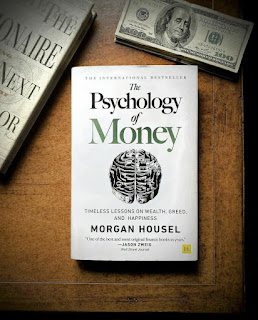Introduction:
The Psychology of Money is a book written by Morgan Housel that delves into the complex relationship people have with money. The book is a collection of essays that explores various aspects of money, such as how it affects our behavior, emotions, and decision-making.
One of the key themes in the book is the idea that our relationship with money is shaped by our experiences and emotions. For example, Housel writes about how people who grew up in poverty may have a different attitude towards money than those who grew up in wealth. He also discusses how our emotions, such as fear and greed, can affect our financial decisions.
Another important theme in the book is the idea that people often have a skewed perception of money and wealth. Housel writes about how people often compare themselves to others and how this can lead to feelings of inadequacy or envy. He also discusses how people often overestimate their ability to predict the future and how this can lead to poor financial decisions.
The book also delves into the historical and cultural aspects of money. Housel examines how different societies throughout history have viewed money and how this has affected their economies. He also discusses how the concept of money has evolved over time and how technology has changed the way we use money.
The Psychology of Money is a thought-provoking and insightful read that is sure to change the way you think about money. It is a great resource for anyone looking to better understand their relationship with money and improve their financial literacy. Whether you are a financial expert or just starting to learn about personal finance, this book is sure to offer valuable insights and perspectives.
Top 10 Lessons from "The Psychology of Money" by Morgan Housel
1. Compounding
Sustained long term investments beat short termed high return interests over time due to compound interest.
Fun fact: Warren Buffet accumulated 97% of his wealth after his 65th birthday.
2. Wealth is what you don’t see
We have a tendency to judge wealth based on what we see: cars, clothes, and houses.
Investment accounts, on the other hand, are not visible. We base our financial success on outward appearances.
3. Freedom
The ability to wake up every morning and say, "I can do whatever I want, when I want, with who I want, for as long as I want," is the ultimate form of wealth.
This, above all, is the highest dividend money can pay.
4. Strategy
Live below your means.
You should value your freedom of autonomy more than buying nice things you wanna have right now.
Use that money to educate yourself and start investing.
Being willing to delay your gratification is a must!
5. Risk
Risk is what is left over after you thought you took everything into account.
It is unpredictable and noone is safe from it.
Risk is gonna decrease over time when you make long term investments and don´t worry about short term volatile market situations.
6. Setbacks
Losing money once in a while is normal but you shouldn´t think that you lost money because you necessarily messed up.
Look at it as a fee for investing and making profitable returns over time instead of a fine that needs to be paid for doing something wrong.
7. Reasonable vs. rational
Beware of the difference between acting upon emotion or rational thoughts.
One is not better than the other.
Sometimes, acting reasonably instead of rationally even when the numbers don´t add up on your spreadsheets, could lead to huge success.
8. Room for error
Morgan assumes that the future returns on his investments will be 13 percent lower than the historical average.
As a result, he saves more than he would if he assumed the future will be similar to the past. It's his margin of safety.
9. Benchmarks
Don´t compare your profits and returns to those of other investors.
Measure your success by what makes you happy and what your goals are.
Investing is not a race and you don´t have to feel ashamed nor entitled based on how little or how much profit you made.
10. Tails, you win
Long tails, or the extremes of the distribution of outcomes, have enormous sway in finance, where a small number of events account for the vast majority of outcomes.
A tail event is the cause of anything huge, profitable, famous, or influential.

